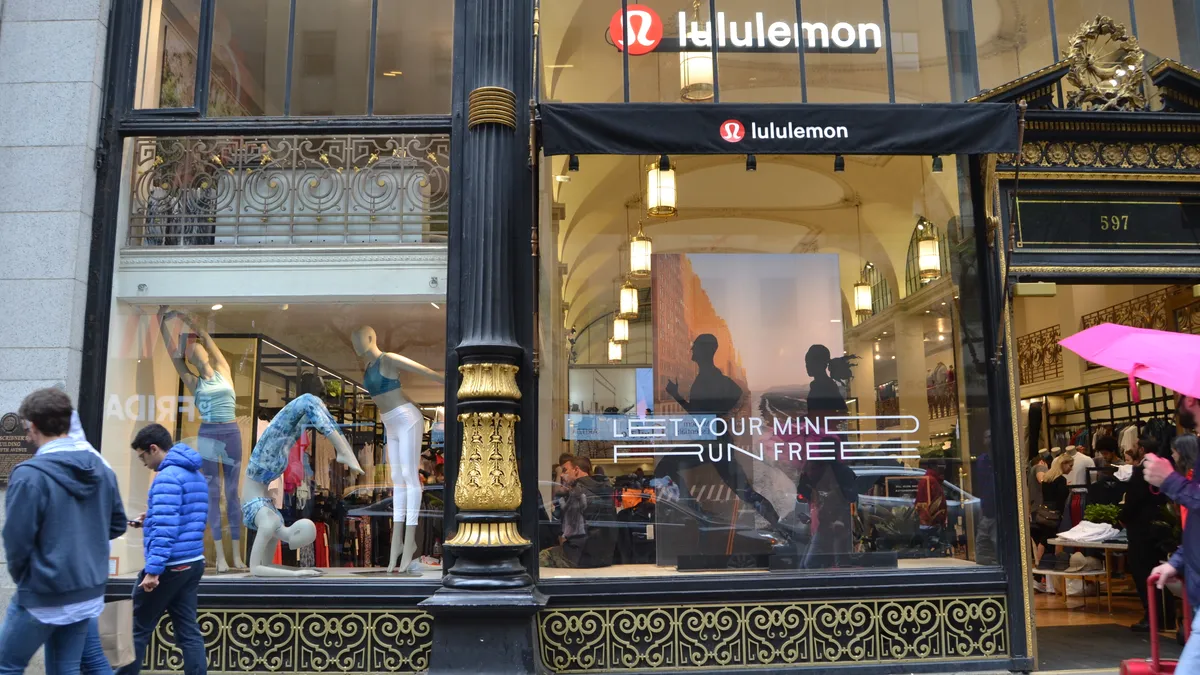Dive Brief:
- Lululemon filed a lawsuit against Peloton in federal court alleging that the fitness company copied its designs in an apparel line Peloton launched this year.
- The suit comes just days after Peloton preemptively sued Lululemon, following a cease-and-desist letter from an attorney for the athleisure maker, and asked a court to declare it had not infringed on Lululemon's design patents.
- From 2016 until this year, Peloton partnered with Lululemon to sell co-branded apparel to the cycle-maker's customers. A Peloton spokesperson declined to comment on active litigation.
Dive Insight:
Peloton and Lululemon have collided as they pursue inverted paths in the fitness arena — with Peloton a fitness tech company expanding into apparel with its own line this year and Lululemon an apparel maker that is moving into fitness tech.
Peloton has actually sold apparel to its members for most of its life as a company. It began doing so in 2014 "as a direct response to Member demand and has historically dropped seasonal and cultural collections in collaboration with a number of brand partners," the company said in September in launching its own line.
Past collections were co-branded relationships, such as that the company shared with Lululemon. Peloton and Lululemon partnered peaceably for five years under such an arrangement wherein Peloton would make wholesale purchases of clothing from Lululemon and then take it to a printer to add Peloton's brand to the products.
In its complaint, Peloton called this arrangement "burdensome and time-intensive" and said that it "was not workable at the high demand levels Peloton started to experience."
The two ended their agreement uneventfully. But shortly after Peloton came out with its own brand, Lululemon cried foul. In the cease-and-desist later, from Nov. 11, Lululemon's attorney described several Peloton apparel products, including bras and leggings, as "copies" of Lululemon's and suggested that the alleged infringement "indicates that Peloton may have used lululemon's proprietary and trade secret information," that the fitness company could have had access to through their previous relationship.
In its complaint, Lululemon elaborated on the allegations. "Unlike innovators such as lululemon, Peloton did not spend the time, effort, and expense to create an original product line," the company said in its complaint. "Instead, Peloton imitated several of lululemon's innovative designs and sold knock-offs of lululemon's products, claiming them as its own." Elsewhere, Lululemon stated that "[t]he misappropriation of lululemon's product designs was not a coincidence."
In its lawsuit, Peloton pointed to differences between the products in question and Lululemon's own and also argued that several of Lululemon's design patents aren't valid.
According to Lululemon, after sending its letter — which threatened a lawsuit if the fitness cycle maker didn't stop selling the products — Peloton wrote back asking until Nov. 24 to respond to the apparel company's demands. Lululemon said it agreed to the extension.
"In requesting the extension, Peloton gave lululemon the false impression that it needed and would use the additional time to properly respond to lululemon's substantive allegations," Lululemon alleged in its complaint. "Instead, Peloton used the delay to secretly prepare its own complaint and preempt the lawsuit that lululemon had so clearly threatened in its letter."
When Nov. 24 came, Peloton filed its action in New York federal court, which Lulumon described as "attempting to improperly wrestle away lululemon's choice of forum."
With its lawsuit, Lululemon is asking that the court block Peloton from selling the disputed products as well as seeking monetary damages. In an emailed statement, Shannon Higginson, Lululemon general counsel and chief compliance officer, said, "We are confident in our position and look forward to properly resolving this case through the courts."
















